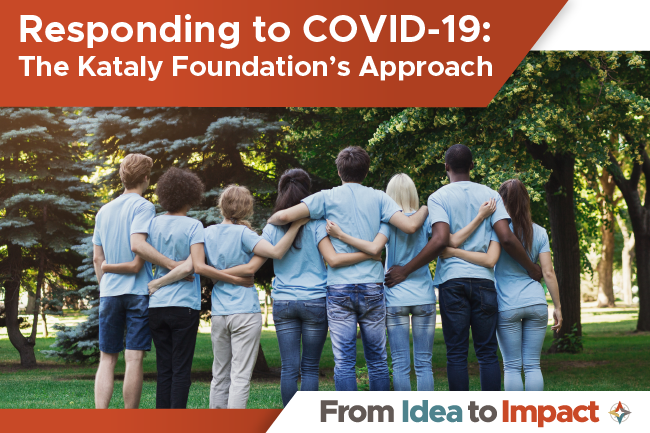Responding to COVID-19: The Kataly Foundation’s Approach

The coronavirus pandemic has forced foundations and philanthropists across the country to reexamine existing processes to better support grantees and the communities they serve. The Kataly Foundation is supporting recovery and resilience with a trust-based, equity-focused approach that others may find instructive.
The Kataly Foundation was created in 2018 by Regan Pritzker and Chris Olin. Kataly’s emerging mission centers on promoting social justice and racial equity in communities most impacted by injustice. They use the Trust-Based Philanthropy model to engage in relationships with grantees, which involves reexamining and shifting the balance of power between funder and grantee to increase equity, transparency, and collaboration.
“In both our board-directed giving and programmatic Kataly portfolios, we are leaning in as partners to the people and organizations working to carve a path toward recovery and resilience. We are operating at our learning edge as funders, growing our understanding of how to best respond to field need and center the expertise and voices of our partners.“ – Regan Pritzker
Like many committed funders, when the COVID-19 pandemic hit, Kataly decided to increase its annual spend beyond the IRS-mandated five percent, despite grappling with the same market conditions impacting endowments everywhere. In reflecting on their role within the social sector, the funders decided to heed nonprofits’ calls for additional support, understanding that this was a moment when stepping up could truly make or break a partner organization’s ability to weather the crisis. Consistent with its mission, Kataly also focused its response on sustaining and building the capacity of organizations led by and serving people of color and communities who have been impacted by injustice.
Across the donors’ board-directed giving and Kataly’s programmatic portfolio, the foundation has already dedicated over seven million dollars in rapid response funding over the past month and has made changes to its existing grant-making practices timeline to accommodate emergent needs. In accordance with the foundation’s values and in the spirit of Trust-Based Philanthropy, the majority of Kataly’s grants were already unrestricted and offered without cumbersome applications or reporting requirements. However, in response to COVID-19, the foundation worked with Arabella to dispense with the few remaining programmatic restrictions tied to certain grants.
Additionally, recognizing the urgency of nonprofits’ need for unrestricted capital, Arabella helped Kataly move up its yearly grantmaking cycle from the fall to the spring, disbursing about $20 million of funding this March and April. This shift has ensured grantees have access to much-needed cash to keep their most critical activities afloat and, in many cases, to pivot their programmatic work toward rapid-response efforts.
In addition to disbursing much-needed relief funding, Kataly has tended to grantee-partner relationships with care in this moment of crisis. Kataly’s team has held conversations to hear how grantee organizations are adapting to the new realities of COVID-19, the struggles they are facing, and the immediate needs they are seeing in their communities. The Arabella team has helped field funding requests and held calls with organizations to gain a fuller understanding of the needs that have emerged within this crisis. It is a testament to the trusted relationships Kataly has built with grantee partners that organizations feel comfortable coming to the funders with candid and vulnerable testimonies of the impact of this crisis.
Across its response, the foundation has sought to embody several practices often discussed in the recent literature on effective philanthropy: leading with humility, seeking to listen to and learn from grantee partners, trusting nonprofit leaders’ knowledge of the most pressing issues in their fields and communities, and seeking to advance equity. These practices can serve as a model for other foundations and philanthropists interested in pursuing a trust-based, responsive approach to grantmaking in the wake of the coronavirus pandemic and beyond.
